
Poker is a card game of chance and skill that can be played in many different ways. It has become a popular pastime for millions of people, and it is played in casinos, card rooms, and private homes. It is considered the national card game of the United States, and its play and jargon are woven into American culture.
In order to succeed in poker, you must first learn the rules of the game. You must also know the differences between different types of hands. In addition to this, you must understand how to read your opponent and make smart decisions when betting. The goal of the game is to win the most money by making the best possible hand.
To do this, you must understand the strengths and weaknesses of each hand. For example, a pair of fours is a very strong hand, while three of a kind is weaker. However, the strength of your hand depends on how it is played.
If you are playing in EP, you should open only strong hands and bluff infrequently. On the other hand, if you are in MP, you can open a bit more, but only with a strong holding. Similarly, when you are on the button, you can bluff more frequently.
When playing poker, you should always try to understand the strength of your opponents’ hands. This will help you to avoid calling bets that you should not be raising. This will increase your win rate and allow you to move up in stakes much faster.
The most important aspect of poker is understanding your opponent’s tendencies. This is not easy, but it will improve your game significantly if you take the time to learn your opponents’ habits. The best way to do this is to analyze your opponent’s play and look for tells. Unlike in live poker, where you can see your opponents’ physical tells, online players can only rely on their patterns. For example, if an opponent is always raising their bets when they have a strong hand, you can assume that they are not afraid to put any amount of money into the pot with mediocre holdings.
As you continue to study poker, you will begin to develop an intuition for hand frequencies and EV estimation. These will become a natural part of your decision-making process, and you will be able to play a more balanced game with more confidence. You will also be able to identify opportunities for bluffing, which is an essential part of any poker strategy.